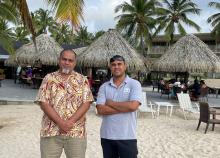Flagged and Ready
Nauru’s Growing Contribution to Sustainable Fisheries in the Western and Central Pacific Ocean
It’s almost sunset in Rarotonga, Cook Islands, and a light breeze blows across sandy white beaches and rustles the thatching of beachside cabanas. Under this relaxing surface, there has been a steady buzz of activity all week. In preparation for the 20th annual session of the Western and Central Pacific Fisheries Commission (WCPFC20), delegates from Pacific Small Island Developing States (SIDS) have been in constant motion throughout the last 10 days.
Among them are Kaleki Deiye and Julian Itsimaera, representing Nauru at WCPFC20. Throughout the day, they’ve been participating in official meetings and small working groups, after a week of detailed coordination with the Parties to the Nauru Agreement (PNA) and members of the Forum Fisheries Agency (FFA). Nauru, a small island nestled in the vast expanse of the Pacific, is a key player in the global production of skipjack tuna. Deeply-ingrained fishing traditions have passed through the generations in both Deiye and Itsimaera’s families, and their commitment as stewards of Nauru’s abundant offshore fisheries resources is not merely professional but also personal.
For Deiye, WCPFC20 will mark his second time attending the annual session. His role of Flag State Officer at Nauru Fisheries and Marine Resources Authority (NFMRA) was created in 2020 to keep up with the rapid expansion of Nauru’s domestic fleet—from 2 fishing vessels in 2018 to 19 vessels and 3 fish carriers today. “Things are changing fast in Nauru Fisheries, and there’s a lot to learn, including requirements of WCPFC measures, but that’s what makes it interesting.”
The Western and Central Pacific Ocean (WCPO), where Nauru is situated, yields 54% of the total global tuna catch with an estimated value of $5.95 billion USD in 2022. Fisheries managers in the WCPO are known to have a “green thumb”, with reference to the healthy and productive status of their tuna stocks. Itsimaera said he finds it rewarding to support his country’s sustainable use of marine resources and contribute to region’s record of success.
As the Enforcement Officer at NFMRA, Itsimaera interacts frequently with Nauru’s expanding domestic fleet too, which prompted both men to undertake a pivotal attachment at the WCPFC Secretariat this past June. Tailored to the needs of Nauru and SIDS with similar challenges, the three-week program provided training on a range of compliance topics, including the Vessel Monitoring System and the annual compliance monitoring report (CMR) process.
With the Secretariat’s assistance, Nauru resolved almost all its 2021 and 2022 reporting issues and gained a deeper understanding of the reasons why the Commission has adopted certain measures. As Itsimaera observed: “Knowledge of the underlying reasons was helpful, because it enabled us to explain to vessels in our fleet and get their buy-in, improving overall collaboration and compliance.”
This week at WCPFC20, the Nauruan delegation anticipates progress on a number of compliance topics, including taking actions to further implement WCPFC Resolution 2019-01 on Climate Change, enhancing the measure on transshipment, and revising the Commission’s keystone tropical tuna measure. In addition, Deiye and Itsimaera hope for constructive discussions in areas where members have divergent positions, including regarding deadlines for implementing 100% biodegradable fish aggregating devices (FADs) and the way forward with respect to the Compliance Monitoring Scheme.
Meanwhile, back in Nauru, another big milestone is looming: the country’s first international seaport is set to open soon. Ensuing port State controls are around the corner, and the arrival of a patrol-class vessel could also be on the horizon, events which will launch Deiye, Itsimaera and their NFMRA colleagues into another exhilarating new chapter.

